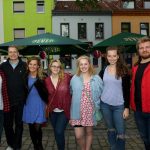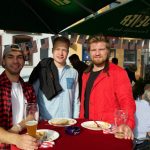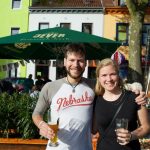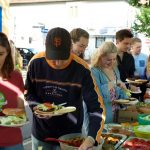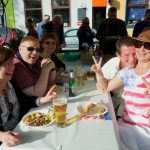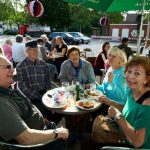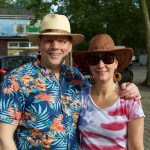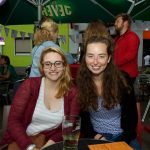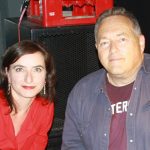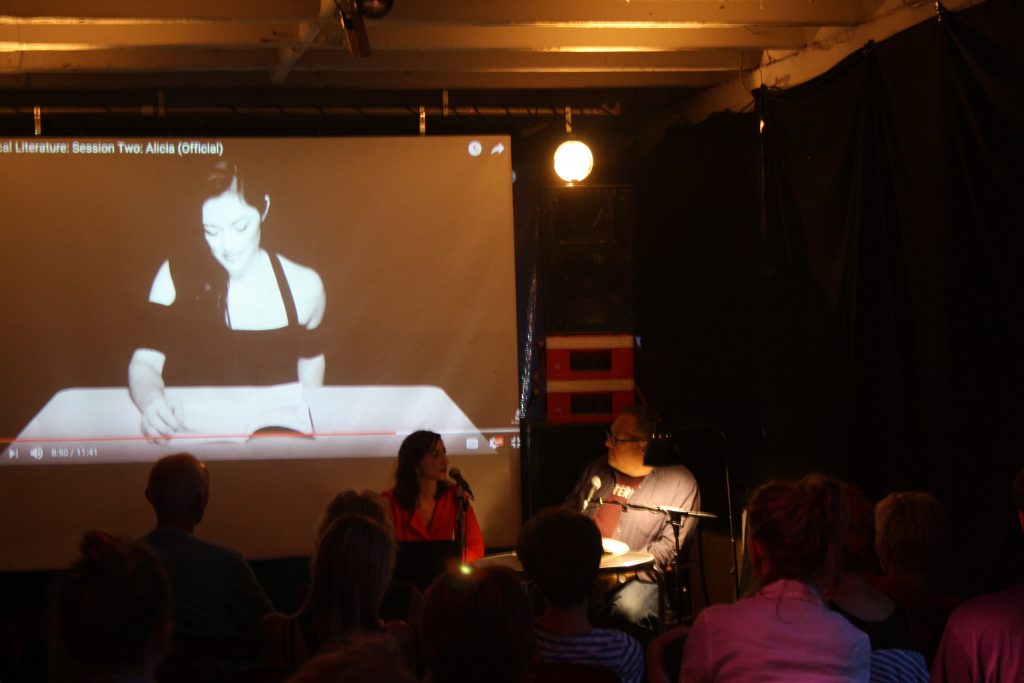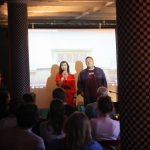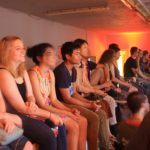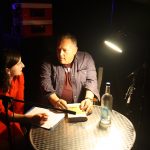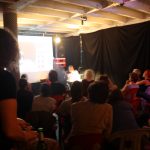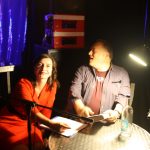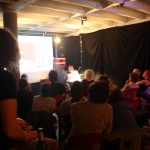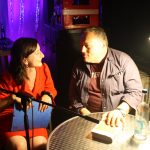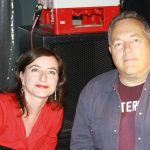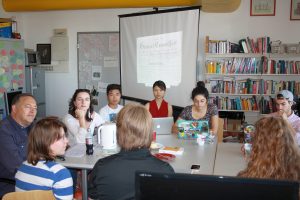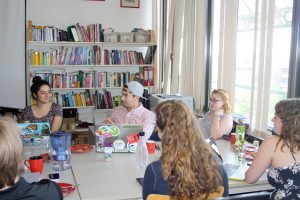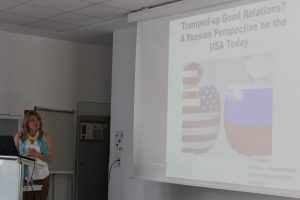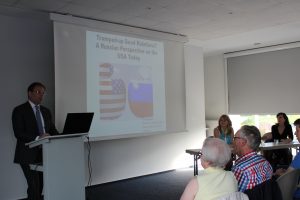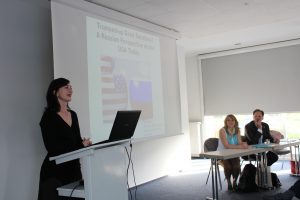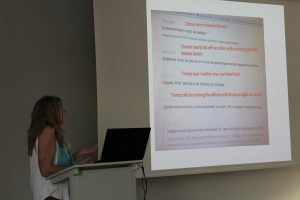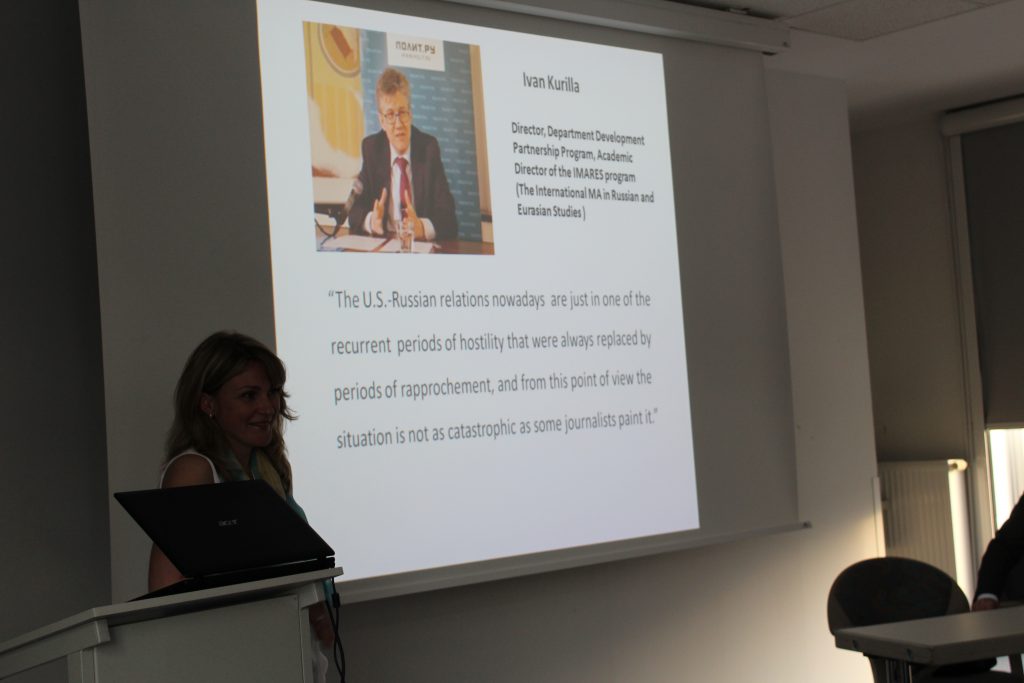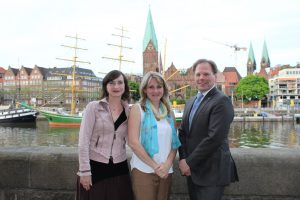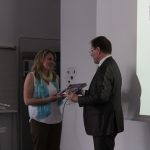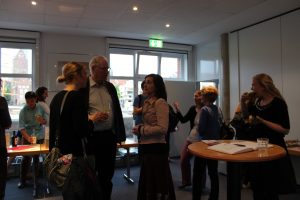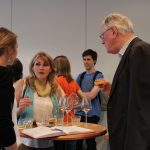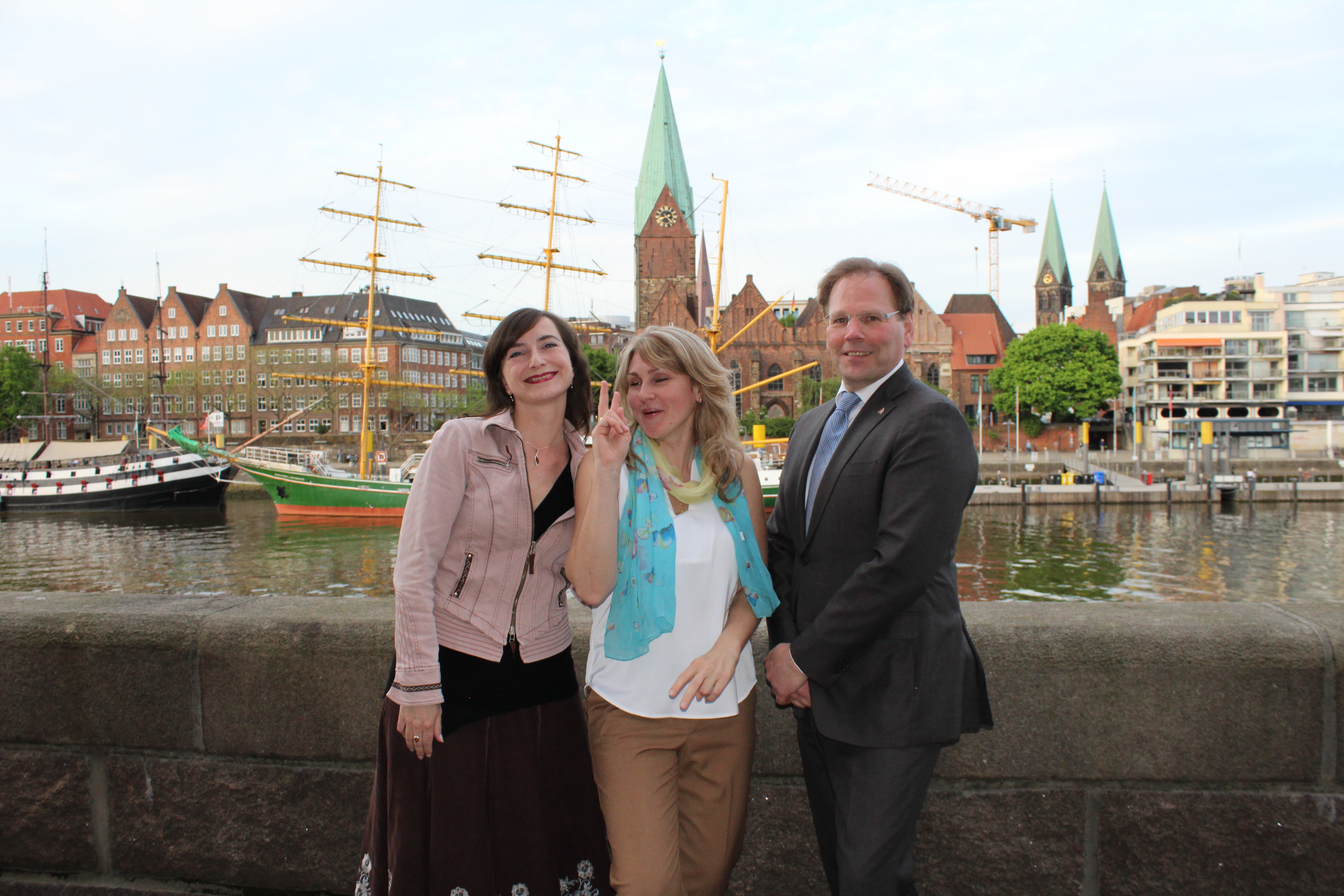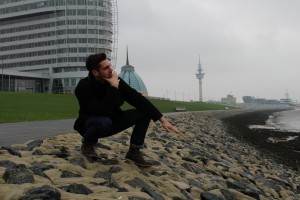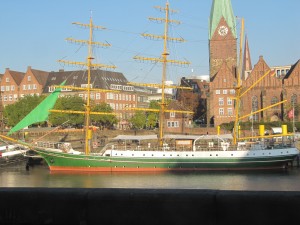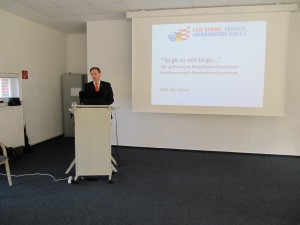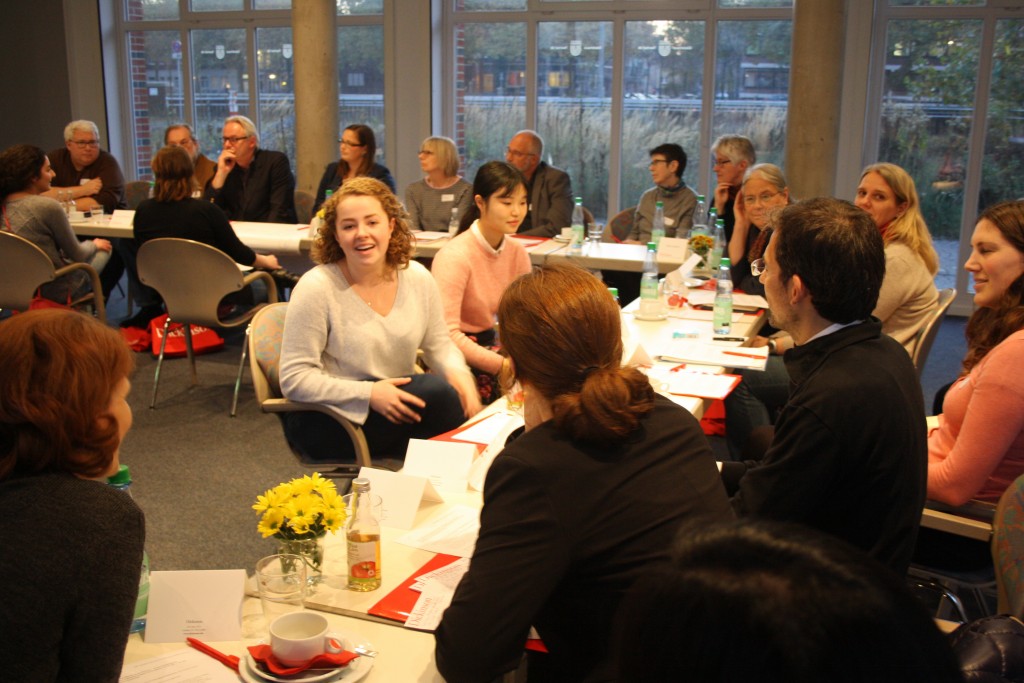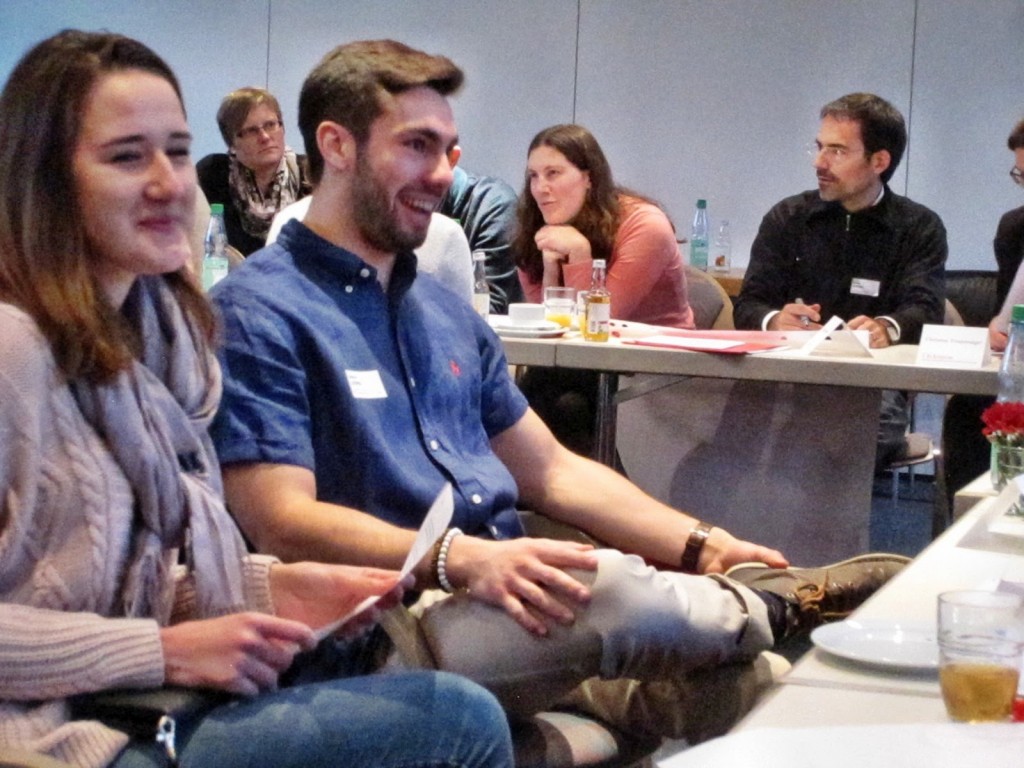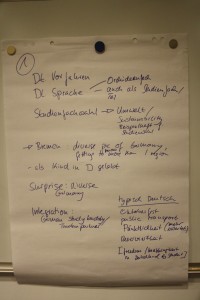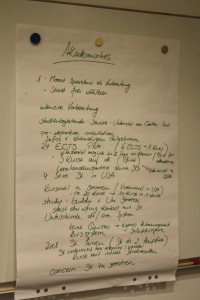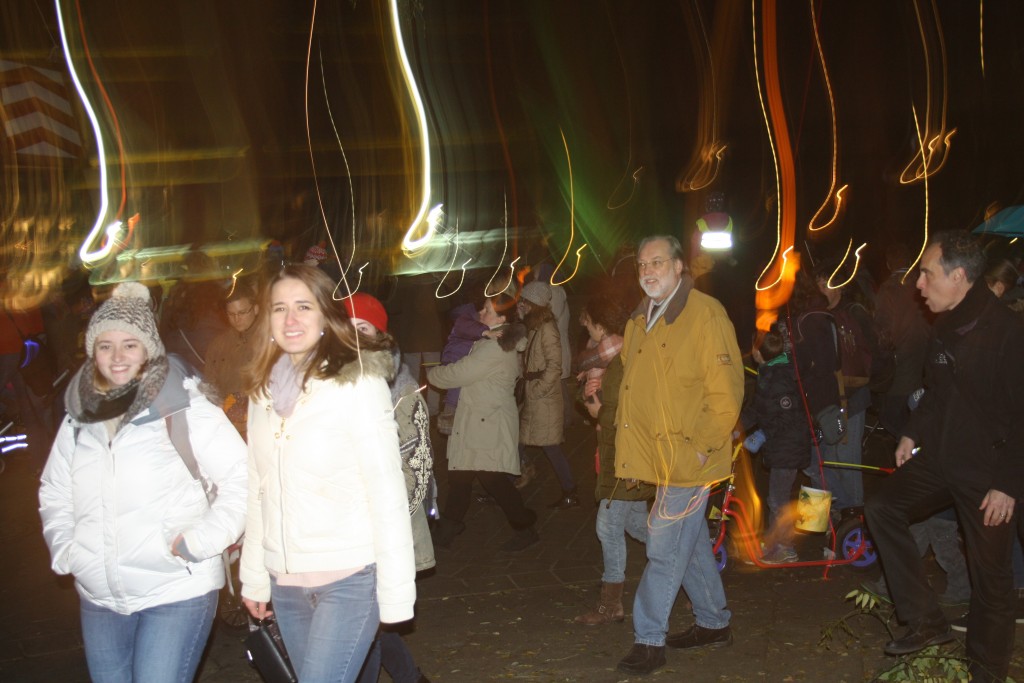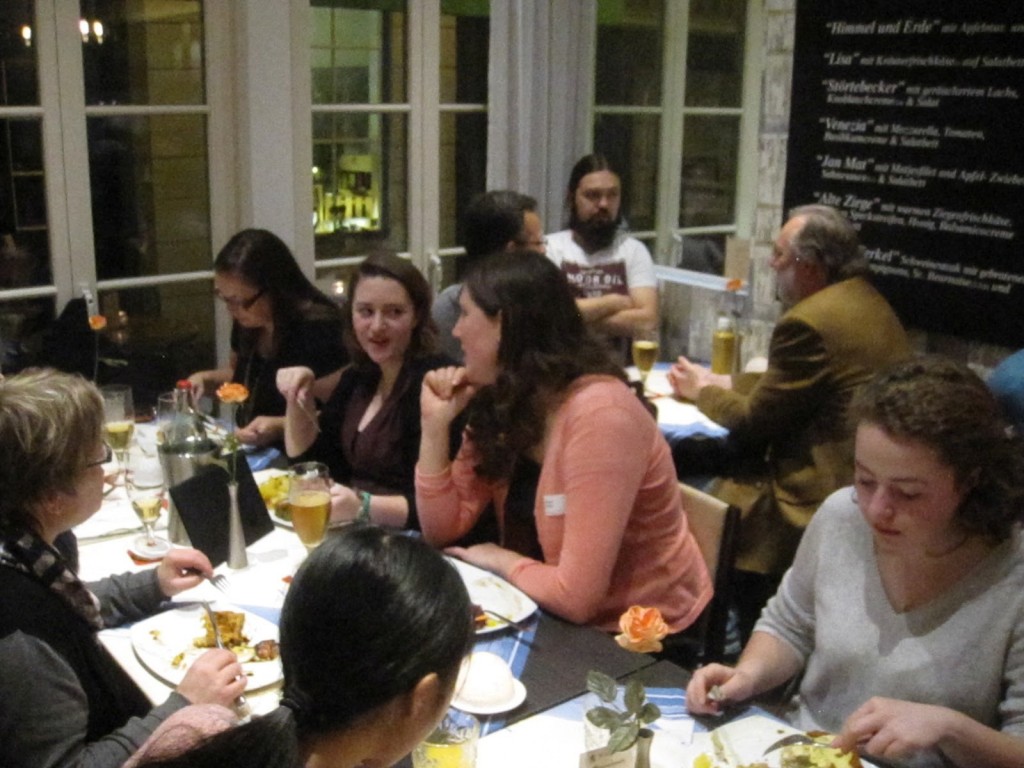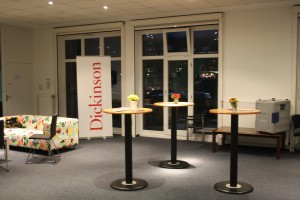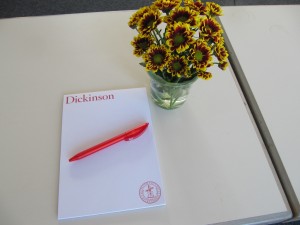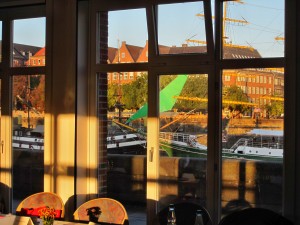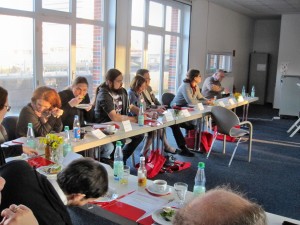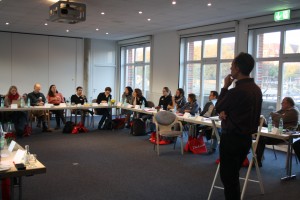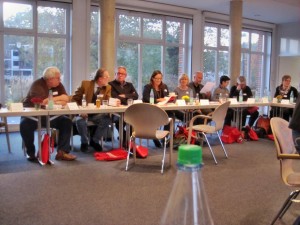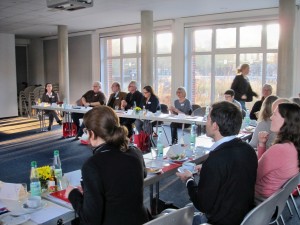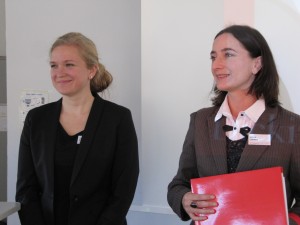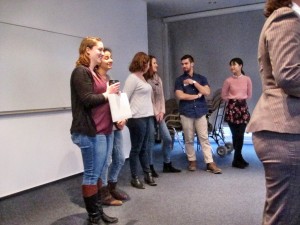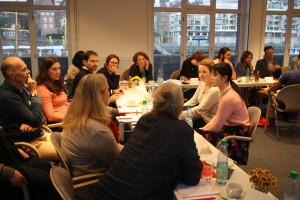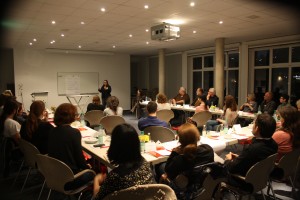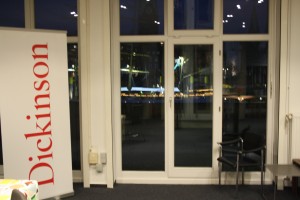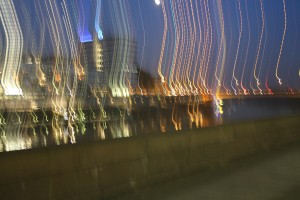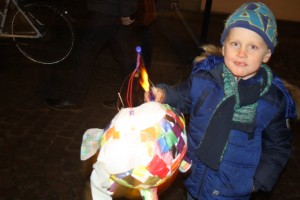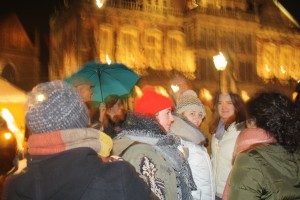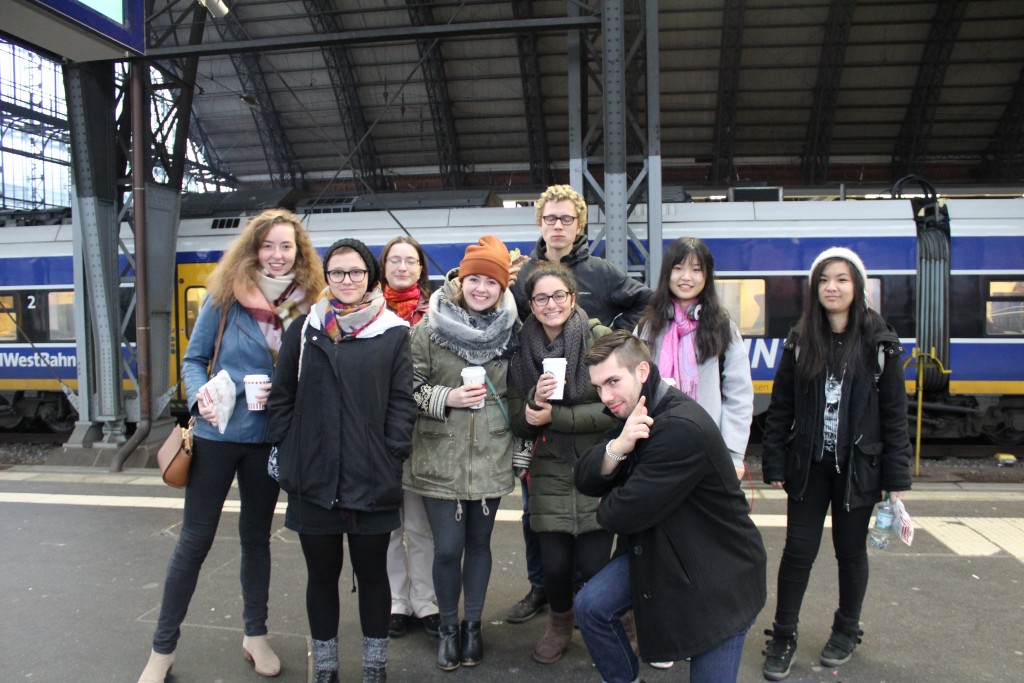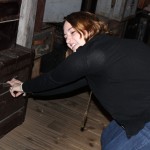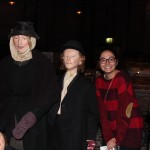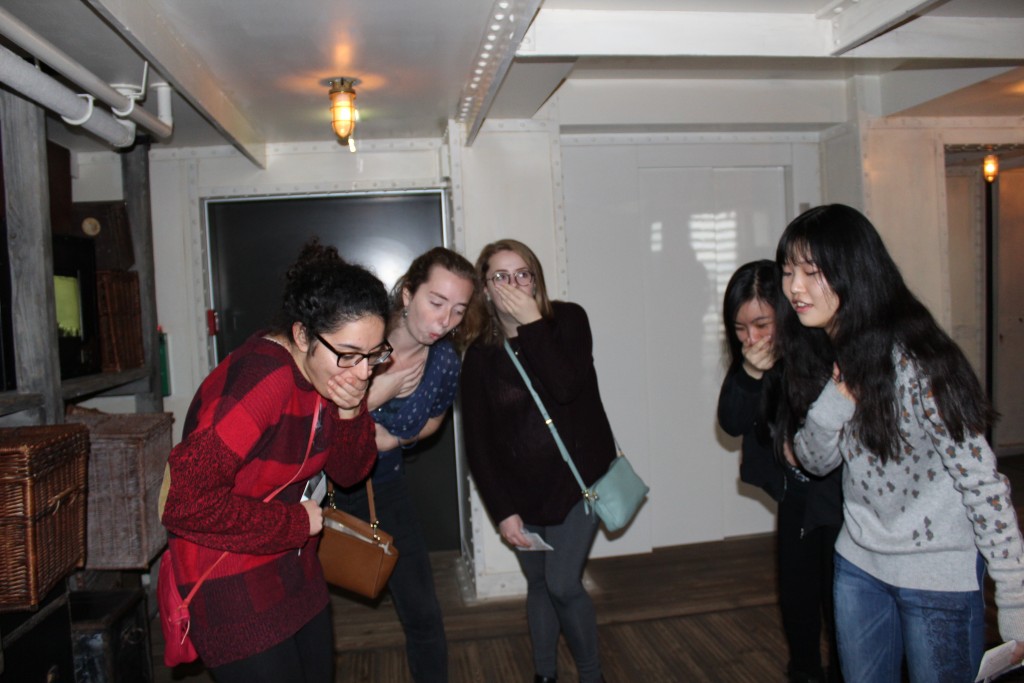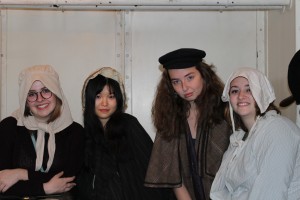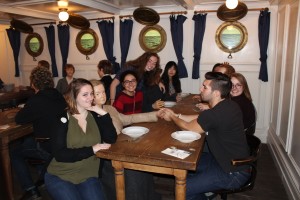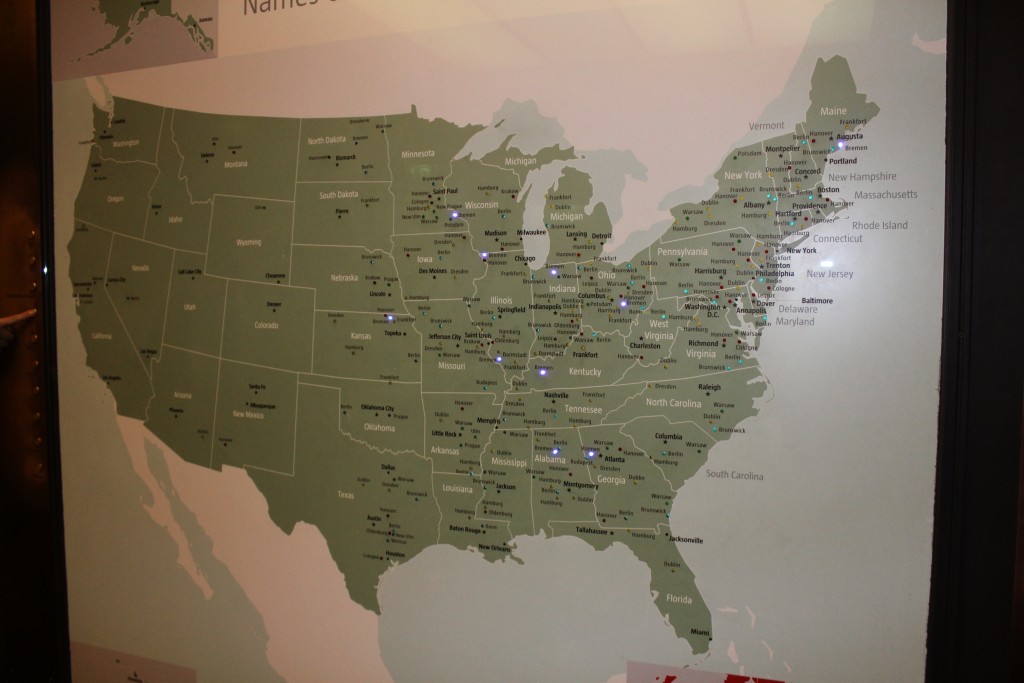As every year, the Carl Schurz German-American Club (CSDAC) hosted a nice 4th-of-July party, gain in potluck and barbecue style. With wonderful weather, big burgers, and great guest, nothing could go wrong. Here are some impressions:
The William ’71 and Elke Durden Literary Series at Bremen #2: Thomas Meinecke
Workshop, Reading, DJ-Set
by Janine Ludwig
On June 2nd and 3rd, 2017, the Durden Dickinson Program in Bremen hosted the acclaimed writer Thomas Meinecke.
Please find the poster here: DLS Meinecke 2017 Poster (Grafikdesign Sibyll Wahrig)
Thomas Meinecke has received several prizes and many labels: postmodern author, writer of pop literature – although pop philosophy would be more accurate – feminist writer and even queer studies icon, because his new novel Self will surely become a reference text. Meinecke’s other professions as a musician, texter and singer of the alternative cult band F.S.K., as a DJ (Berghain, Pudel Club a.o.) and performer with the format “turntable” (Plattenspieler) at the Berliner Hebbel am Ufer, seem to reflect in his postmodern writing style: His writing technique has been described as sampling, t.i. mixing and juggling with phenomena of 20th and 21st century pop history as well as of diasporas and gender identities, and is based on a wide theoretical background, ranging from Judith Butler to Barbara Vinken.
Public lecture and DJ-Set in the club Spedition on June 3rd
His brand new novel Self (“Selbst”) deals mainly with blurring (gender) identities, love, and erotic desire by analyzing phenomena from fashion (androgynous models), music/ entertainment (e.g. David Bowie or Mykki Blanco music videos), and life style (techno clubs, selfies, beards, intimate shaving, feminist porn). As part of “The William ’71 and Elke Durden Literary Series at Bremen,” he held a public lecture in the off-scene arts & culture & music club Spedition which had hosted him before. An attentive audience of 60-70 people followed a lively mix of reading, video clips and discussion between Meinecke and presenter Janine Ludwig. Afterwards, DJ Winkhorst warmed up the crowd before Thomas started to turn the tables from midnight to 3 a.m.
Workshop at the University of Bremen, in cooperation with the IfkuD, on June 2nd
In addition, Meinecke gave an intimate breakfast workshop to both our current group of Dickinsonians and Bremen students at the University of Bremen the day before. One of the threads of his multi-perspective novel happens to deal with utopian, libertarian German immigrants in Texas in the mid-19th century. Ironically, a German society of nobleman (“Adelsverein”) bought land in Texas in order to get rid of German communists by sending them there to colonize it. However, they were duped with dour land, and the colonists, a bunch of intellectuals with little farming experience anyhow, struggled for survival. They did, however, under John O. Meusebach, manage to sign a peace treaty with the hostile Comanche tribe – supposedly the only one which was never broken and is still commemorated annually by the Comanches today.
Meinecke has extensively researched on these settler colonies and produced a film (at the behest of Alexander Kluge/dctp) for which he interviewed the descendants of the “Texas Germans” – who still speak the language, infused with some English terms: “Die sind hier reingemoved.” „Die Kuh ist über den fence gejumpt.“ Despite the settlement fiasco, the descendants still proudly remember the peace treaty as well as the fact that the colonists opposed slavery and some even defected from the confederate Army (and were killed in consequence). We watched snippets from the film, read passages from the book and discussed the idea of “communes” without government, but shared work and property. The workshop presented amazing insights into an almost forgotten culture between the “Beethoven Männerchor” in San Antonio, the “Wurstfest” in New Braunfels, the “Vereins Kirche” and “Social Turn Verein” in Fredericksburg (named after Frederick of Prussia). All this followed up nicely to the seminar “German 340: Comparative Cultures – USA/Germany” which Janine Ludwig taught in fall 2016/17 and which (among other things) covered German immigration to the US in the 18th and 19th centuries. But most of all, it was a unique opportunity for the students to meet, work, and discuss with an author of such a stature in an almost private atmosphere.
The William ’71 and Elke Durden Literary Series at Bremen, this year in cooperation with the Institute for Cultural Studies (IfkuD) at the University of Bremen and the Kunst- und Kulturverein Spedition e.V., was sponsored by Bill and Elke Durden and the Dickinson College. We are grateful for the generous support and also thank the Spedition for wonderfully hosting Saturday’s evening event.
4th Dickinson College Public Lecture
On May 15, 2017, the Carl Schurz German-American Club Bremen and Dickinson College invited members of the University of Bremen and citizens to the Fourth Dickinson College Public Lecture on:
“Trumped-up Good Relations? – A Russian Perspective on the USA Today”
with Dr. Irina Filippova
When Donald Trump was elected as the 45th President of the United States of America on November 8th, 2016, many were shocked – but others may have harbored faint hopes as well. Since Trump had already announced his intention to improve American relations with the Russian Federation, many Russian citizens might have expected a new thaw between the two nuclear powers. But events of the last few months have left an ambivalent impression: Amid allegations that Russia attempted to influence the US presidential election, President Trump’s team is also under attack from his own party for its members’ relationships with Russian contacts and for his recent air strike in Syria.
This raises the question of what Russians think of and expect from the USA right now. And more importantly, will future generations be able to improve relations? Irina Filippova, Director of the Dickinson-in-Russia Program at the Russian State University for the Humanities in Moscow (RGGU), provided us with some answers. She had collected statements from colleagues at the RGGU, from the press, from Muscovites, and from Dickinson students currently studying in Moscow. Rather than presenting a political analysis of what can only be described as an uncertain status quo, she gave us a first-hand insight into public opinion in Russia, and the mindset and sentiments of so-called “ordinary people” there.
 First, she offered a brief overview of the checkered history of Russian-American relations from the 16th century to today. It started with a meeting of Russian Tsar Peter the Great and William Penn – the founder of the Pennsylvania Colony – as a first diplomatic meeting of the two countries in 1698. From the selling of Alaska in 1867 to the Russian revolution in 1917, to being allies in World War II and enemies in the Cold War to the recent Russian transgressions in Crimea and the Donbas in Ukraine, the relations between the countries have currently overall deteriorated.
First, she offered a brief overview of the checkered history of Russian-American relations from the 16th century to today. It started with a meeting of Russian Tsar Peter the Great and William Penn – the founder of the Pennsylvania Colony – as a first diplomatic meeting of the two countries in 1698. From the selling of Alaska in 1867 to the Russian revolution in 1917, to being allies in World War II and enemies in the Cold War to the recent Russian transgressions in Crimea and the Donbas in Ukraine, the relations between the countries have currently overall deteriorated.
 Dr. Filippova introduced different Russian polling agencies and showed several polls from October 2016 to April 2017 – that clearly indicated how there were some hopes for an improvement in political relations and some support for Donald Trump, but how those have decreased dramatically within those 6 months. Filippova complemented this development with translated headlines from Russian newspapers and pointed cartoons. She rounded up her findings with statements from academics from RGGU. Her personal poll among Russian students and Muscovites of ages around 40 showed that, unfortunately, the younger people seemed generally less interested in politics than the older ones and that both groups have come to rather pessimistic views on the future relations between the United States and Russia.
Dr. Filippova introduced different Russian polling agencies and showed several polls from October 2016 to April 2017 – that clearly indicated how there were some hopes for an improvement in political relations and some support for Donald Trump, but how those have decreased dramatically within those 6 months. Filippova complemented this development with translated headlines from Russian newspapers and pointed cartoons. She rounded up her findings with statements from academics from RGGU. Her personal poll among Russian students and Muscovites of ages around 40 showed that, unfortunately, the younger people seemed generally less interested in politics than the older ones and that both groups have come to rather pessimistic views on the future relations between the United States and Russia.
 However, our Dickinson students currently studying in the Moscow program explained how important it is to them, besides all clear differences, to engage in discourse and to be confronted with opposing views from Russian students. Those Dickinson students believe in the importance of intensive study abroad programs as Dickinson offers them – they keep communication alive against all odds and train future competent global citizens who hopefully manage to improve political situations in the future.
However, our Dickinson students currently studying in the Moscow program explained how important it is to them, besides all clear differences, to engage in discourse and to be confronted with opposing views from Russian students. Those Dickinson students believe in the importance of intensive study abroad programs as Dickinson offers them – they keep communication alive against all odds and train future competent global citizens who hopefully manage to improve political situations in the future.
Vienna Excursion 2017
My tips, tricks, and favorite things in Vienna, Austria
Meghan Straub
Vienna has quickly become one of my favorite places in the world. I had the wonderful opportunity of living in Vienna for a month while completing my intensive course before coming to Bremen. It was an amazing month filled with travel, history, music, and ice cream. I had such a great time that it was hard for me to pack up my things and leave to start the program in Bremen. Little did I know it then but I would return to my European home of Vienna 2 more times this year (once with my parents and once with the program). As part of the Dickinson in Bremen program we have the opportunity to go on a weeklong excursion to Vienna. We spend the week learning about the history of the city as well as experiencing all of the many facets of culture Vienna has to offer. In this blog I’d like to share some of my favorite moments from the excursion as well as some of my tips as someone who knows Vienna well. But as Julie Andrews says lets start at the very beginning…
- Stephan’s Cathedral
 Located at the very center of the city, St. Stephan’s is the most important building in the whole city. It is an easy navigation point, many of the city’s sites are within a 10-minute walk from its front door, and it is one of the most beautiful churches I’ve ever seen. We got an “All Inclusive” ticket which let us do the audio guided tour of the inside of the cathedral, a tour of the catacombs, an elevator ride to the north tower, and the climb up to the south tower. When I was living in Vienna, I never had the chance to do all of these so I was excited and St. Stephan’s didn’t disappoint. I learned so much about the church from the audio guide and the views from the towers just can’t be beat.
Located at the very center of the city, St. Stephan’s is the most important building in the whole city. It is an easy navigation point, many of the city’s sites are within a 10-minute walk from its front door, and it is one of the most beautiful churches I’ve ever seen. We got an “All Inclusive” ticket which let us do the audio guided tour of the inside of the cathedral, a tour of the catacombs, an elevator ride to the north tower, and the climb up to the south tower. When I was living in Vienna, I never had the chance to do all of these so I was excited and St. Stephan’s didn’t disappoint. I learned so much about the church from the audio guide and the views from the towers just can’t be beat.
- The Austrian National Library
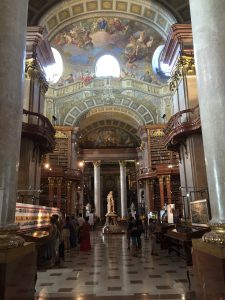 Just down the Graben (the pedestrian area at the center of the city) and around the bend is the Hofburg Palace of the Habsburg dynasty and within this gorgeous palace is the National Library. I’d been to the library before, but this time, we had the extremely fortunate opportunity of getting a special tour. We learned all about the care of the books and the history of the building. The best part for me was getting able to see some selected books like a Gutenberg Bible up close and even touch it. My nerdy book-loving soul was close to exploding. The trip to the library was an absolute highlight of our trip for me.
Just down the Graben (the pedestrian area at the center of the city) and around the bend is the Hofburg Palace of the Habsburg dynasty and within this gorgeous palace is the National Library. I’d been to the library before, but this time, we had the extremely fortunate opportunity of getting a special tour. We learned all about the care of the books and the history of the building. The best part for me was getting able to see some selected books like a Gutenberg Bible up close and even touch it. My nerdy book-loving soul was close to exploding. The trip to the library was an absolute highlight of our trip for me.
- Peter’s Church
 My favorite place in all of Vienna is St. Peter’s church. Located right off the Graben, St. Peter’s is often overlooked. This church is beautifully decorated and offers free concerts almost every night around 7:30pm. They put out a schedule of the weeks events including concerts by violinists, singers, and most importantly (in my opinion) organists. My favorite thing to do in Vienna is to take a late night walk from the Rathaus through the Volksgarten and the Hofburg all the way to my final stop at St. Peter’s church just in time for the concert. There is something magical about sitting in the candle-lit church as a talented musician plays Bach’s Toccata and Fugue on the organ while the whole
My favorite place in all of Vienna is St. Peter’s church. Located right off the Graben, St. Peter’s is often overlooked. This church is beautifully decorated and offers free concerts almost every night around 7:30pm. They put out a schedule of the weeks events including concerts by violinists, singers, and most importantly (in my opinion) organists. My favorite thing to do in Vienna is to take a late night walk from the Rathaus through the Volksgarten and the Hofburg all the way to my final stop at St. Peter’s church just in time for the concert. There is something magical about sitting in the candle-lit church as a talented musician plays Bach’s Toccata and Fugue on the organ while the whole  building shakes from the sound. I highly recommend stopping by if you get the chance. The price (just a tip for the musicians) can’t be beat.
building shakes from the sound. I highly recommend stopping by if you get the chance. The price (just a tip for the musicians) can’t be beat.
- The Vienna State Opera
 The city of Vienna is filled with music everywhere you go and the very center of that music is at the state opera house. Located between the Graben and the Ringstraße, the Vienna State Opera is housing performances every night including ballets and of course Operas. As a famous attraction in Vienna, the ticket for the Opera can be quite expensive and often go fast. If you really want to see a performance there you have two options. The first is acquiring a standing room ticket. If you wait outside the building in a line about 80 minutes (or more depending on what show is being performed) before the show you can get a ticket for around 3 euros. Though time consuming and often grueling on hot days, a ticket for that price is hard to pass up. Another option is the large screen outside of the opera house on Kartnerstraße. A couple nights a week the opera displays the performance of the night outside free to the public on a large screen. People bring chairs and blankets to sit outside and enjoy the good weather and beautiful voices for free. If you, like me, aren’t that interested in hearing the voices of the world’s best singers and are more interested in seeing what the inside of the opera house looks like tours are also provided during the day. For about 4 euros (with a student discount) you can go on a tour of the interior of the building and learn all about how the shows are organized and the long history and tradition of opera in Vienna. I highly recommend.
The city of Vienna is filled with music everywhere you go and the very center of that music is at the state opera house. Located between the Graben and the Ringstraße, the Vienna State Opera is housing performances every night including ballets and of course Operas. As a famous attraction in Vienna, the ticket for the Opera can be quite expensive and often go fast. If you really want to see a performance there you have two options. The first is acquiring a standing room ticket. If you wait outside the building in a line about 80 minutes (or more depending on what show is being performed) before the show you can get a ticket for around 3 euros. Though time consuming and often grueling on hot days, a ticket for that price is hard to pass up. Another option is the large screen outside of the opera house on Kartnerstraße. A couple nights a week the opera displays the performance of the night outside free to the public on a large screen. People bring chairs and blankets to sit outside and enjoy the good weather and beautiful voices for free. If you, like me, aren’t that interested in hearing the voices of the world’s best singers and are more interested in seeing what the inside of the opera house looks like tours are also provided during the day. For about 4 euros (with a student discount) you can go on a tour of the interior of the building and learn all about how the shows are organized and the long history and tradition of opera in Vienna. I highly recommend.
- The Prater
 Right outside of the inner city of Vienna is the Prater. Founded in 1766, the Prater is essentially an amusement park. The park is open from 10am until 1am and housing tons of restaurants as well as rides. The most famous of which is the Wiener Riesenrad or Ferris wheel. The wheel is 212 feet tall and is famous for its appearance in the movie The Third Man. My favorite ride is not the famous Ferris wheel but rather the tower swings. The Prater Tower is 117m high and offers a breathtaking view of the whole city. If you are afraid of heights it will likely be too much for you but otherwise it is a great way to see the whole city for only 5 euros.
Right outside of the inner city of Vienna is the Prater. Founded in 1766, the Prater is essentially an amusement park. The park is open from 10am until 1am and housing tons of restaurants as well as rides. The most famous of which is the Wiener Riesenrad or Ferris wheel. The wheel is 212 feet tall and is famous for its appearance in the movie The Third Man. My favorite ride is not the famous Ferris wheel but rather the tower swings. The Prater Tower is 117m high and offers a breathtaking view of the whole city. If you are afraid of heights it will likely be too much for you but otherwise it is a great way to see the whole city for only 5 euros.
I hope that these tips/suggestions help you to get the most out of your visit to Vienna if you get the opportunity to go. If you do, I hope you enjoy it as much as I have this past year. Ciao!
Bremen is fun?
by Lee Mottola
After a summer working in a picturesque Bavarian mountain town and a subsequent month in Munich during Oktoberfest it’s safe to say my threshold for fun has reached one of its highest points. With that in mind I was looking towards my next new start in Bremen with mixed feelings. Sure, I would be getting back to a university and all the excitement that comes from being around other 20 something’s in a country where even my little sister could legally drink, but Bremen isn’t exactly known for its party scene. Even among abroad options at Dickinson it’s pretty much ignored by anyone who isn’t pining for the self-torture that is learning the German language (I jest).
After a few days of pre-orientation all the German students arrived and life began to spring up on the concrete and steel campus that I now call my own. The first week of orientation here in Germany is pretty much syllabus week back at Dickinson, except with even less classes. There’s also the small fact that before orientation week you haven’t chosen classes yet. The first two weeks are dedicated to trying every conceivable class you could have interest in. I personally started with 20 and ended with 4 and that is pretty normal.
That being said 20 courses in two weeks wasn’t going to stop me from having fun and if there was one thing I learned from being in Germany for months previous, it’s that if you want to have fun you have to make it. It doesn’t matter if you don’t speak the language, if you’re on your own or nervous, just jump in and take a chance. That is what study abroad is about right? Anyways, German-syllabus week was flush with opportunities to jump in, from dance parties in a rented-out tram cart to bar tours throughout the infamous Kultur Hub of the Viertel anything and everything was on the table. There was also a very interesting underground Deutsch Rap concert mixed in much to my surprise. It all culminated in a trip for my fellow Politikwissenschaft first years to some sleep away camp outside of the city where we drank the obnoxious amount of beer provided to us by older students in the major and danced to horribly chosen playlists (also provided by the older students in the major) Sure, there was a lot of drinking but I guess that’s could actually be considered a German cultural event if you don’t think too hard about it. In that first week, I met almost all of the people, German, Polish, Italian or otherwise that are now my closest friends here. Throughout the summer and my time in Munich I never had that much luck meeting people. The difference between them? Here in Bremen I jumped into every opportunity I got and in the process I also figured out Bremen is pretty fun.
Dickinson Hosts Conference In Bremen
Dickinson students participate in a Resident Directors Conference hosted by the Durden Dickinson Bremen Program
On November 11th and 12th, 2016, the Dickinson Durden Bremen Program hosted the annual conference of the Association of American Study Abroad Programs in Germany (AASAP). 27 members of the association, plus speakers and students, met at the guest house of the University of Bremen “Auf dem Teerhof 58,” which was purchased in the 1980s with the support of Dickinson College. The venue is beautifully located on an island in the river Weser.
The participants, representing different German-American study abroad institutions from all over Germany, discussed trends and goals in study abroad. The keynote speaker, Neil van Siclen, President of the Carl Schurz German-American Club (CSDAC) in Bremen, presented an insightful meta-study on motivations of American students for studying abroad (in Germany). Please find the conference program, van Siclen’s presentation, and a video here:
Neil van Siclen Presentation RD Conference
© Anneke ter Veen, CompanyTeeVee
Student Workshop: One Month at Uni Bremen – Student Experiences
The exchange of experiences between program directors helps them to strive towards improving their programs and adapting to new trends and situations. Thus, one of the highlights of the conference was a workshop with 6 Dickinson students who are currently spending their junior year abroad at the University of Bremen: Katelyn King, Yelyzaveta Konovalova, Zhen Luo, Lee Mottola, Caroline Pappalardo, and Meghan Straub talked to the participants about their experiences, motivations, and strategies in three different areas: 1. Expectations and Reasons for Choosing Germany, 2. Cultural Matters. First Impressions, 3. Academic Matters. First Impressions of Courses.
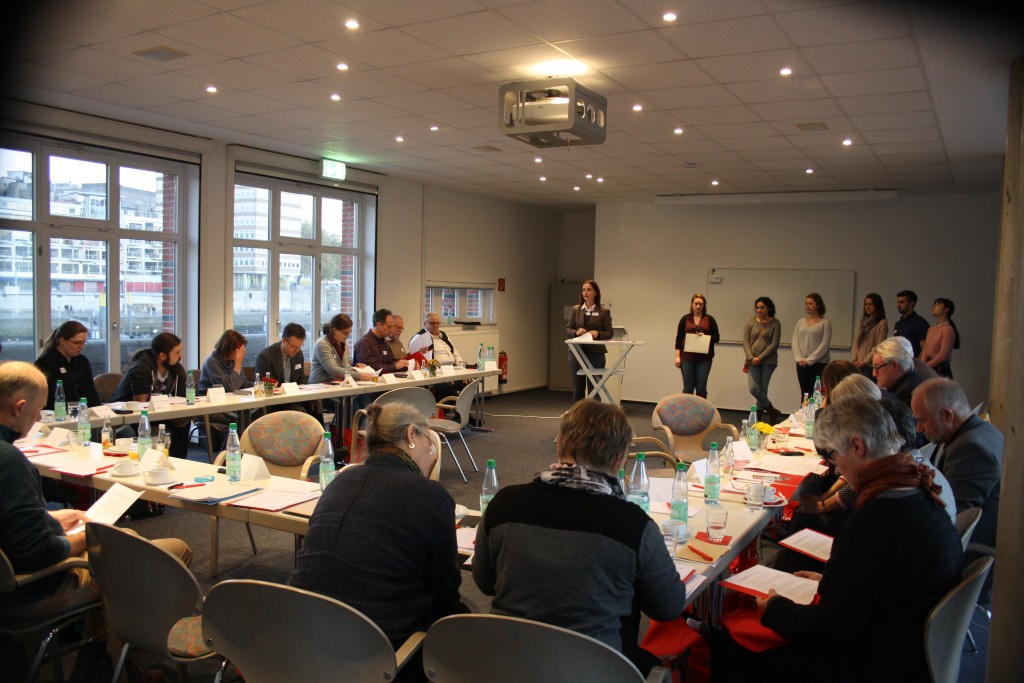
Moderator Janine Ludwig (next to the Dickinson students) explains the format of the rotating talks before the panel
After the roating talks, the participants who had written flip chart posters, presented summaries of their talks with the students. They were very impressed with the Dickinson students, not only with the great German they spoke, but also with the interesting reflections they shared.
Please find the student statement summaries here:
DiB RD Conference Student Workshop – English JL
In the evening, the participants and students took part in the Bremen lantern walk for St. Martin’s day and had dinner together.
The William G. and Elke Durden Dickinson in Bremen Program – represented by the Academic Director Dr. Janine Ludwig and the Program Coordinator Verena Mertz – and the AASAP, represented by Chief Executive Dr. Kurt Gamerschlag, would like to thank Neil van Siclen (CSDAC), Dr. Annette Lang, Head of the International Office of the University of Bremen, the participants, and our students for making this a successful conference!
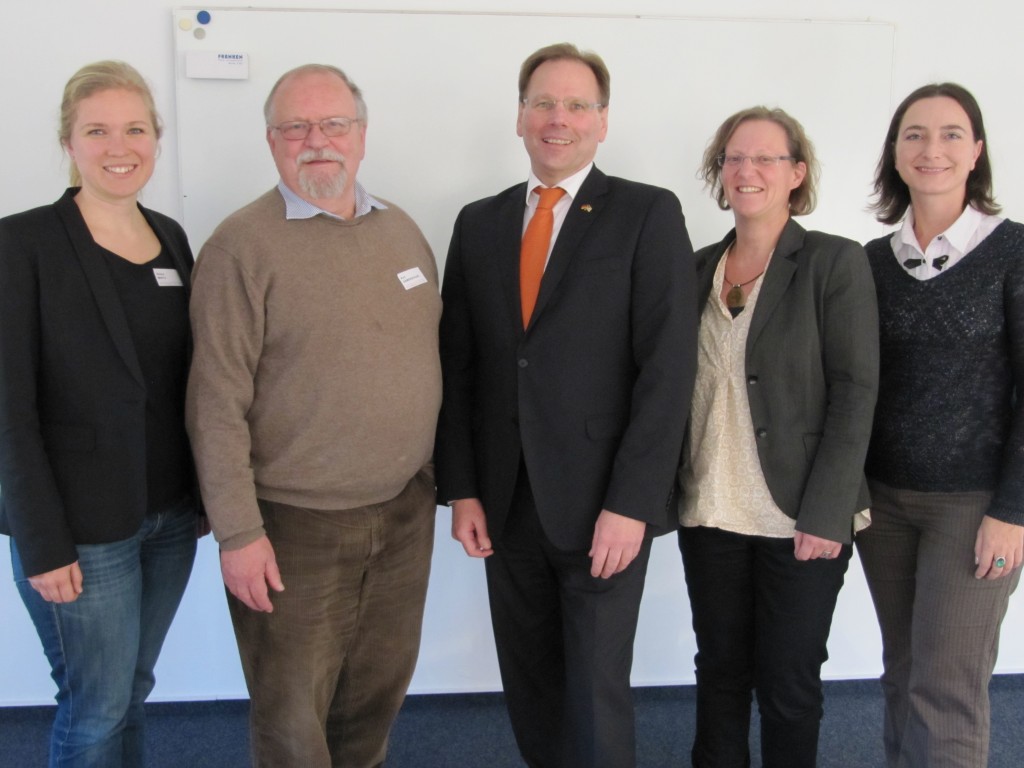
Verena Mertz, Kurt Gamerschlag (AASAP), Neil van Siclen (CSDAC), Annette Lang (Uni Bremen), Janine Ludwig (from left to right) © Anneke ter Veen
Emigration Museum: an Adventure Through Time and Genealogy
by Kate King
Most people familiar with the German Department at Dickinson are aware that in Bremen full year students take one Dickinson course taught by Dr. Ludwig, better known as Janine, our academic director. The course is a cultural comparison of Germany and the USA. In our first few classes, we discussed emigration from Germany to the USA, which began in the late 1600’s and continued, usually in waves depending on what was going on in Europe, for the next few hundred years.
 To learn more about this, we took a field trip to Bremerhaven (the second city of the Bremen city-state) to visit the Deutsches Auswanderer Haus, or German Emigration Center. Bremen bought Bremerhaven in 1827 to replace its inland ports that were at risk from sediment deposition and it quickly became a hot spot for emigration due to the quick access to the North Sea and Atlantic Ocean.
To learn more about this, we took a field trip to Bremerhaven (the second city of the Bremen city-state) to visit the Deutsches Auswanderer Haus, or German Emigration Center. Bremen bought Bremerhaven in 1827 to replace its inland ports that were at risk from sediment deposition and it quickly became a hot spot for emigration due to the quick access to the North Sea and Atlantic Ocean.
Now if anyone reading this knows me, you probably know that I am a double science major and I minor in German for the language skills – I do not enjoy museums. I am like a three-year-old child in museums: if you don’t keep my attention with interactive things, I get tired and hungry and just want to go home. This museum catered to my inner toddler. Upon arrival, we were all issued boarding passes with the name of an emigrant of Germany and another name of an immigrant that came to Germany.
We started the tour by entering a replica of the waiting hall, which was part of the original emigration office that millions of people went through to leave Europe.
We were then guided into the next room to the docks where heard farewells from families. The next room, the Gallery of the 7 Million, allowed us to hear the personal stories of our emigrants. We then climbed the stairs of the ship seen from the docks and entered the ship to begin our voyage.
We ended up walking through different points in technological developments. The first had a small room, close to a double dorm room on Dickinson’s campus, with most of the room being built up into a bed with hay, a bucket, and no electricity. The room would have been shared by multiple families. The next stage had more of individualized bunk beds and a bathroom. The final stage had individual beds with proper sheets and an attached dining room with windows, all with electricity.
After we enjoyed our dinner with the passengers, we arrived in the New World. We were taken to Ellis Island where we were tested to see if we could enter the country. If we passed (Lee did not), we could continue to New York City to Grand Central Station. At Grand Central we listened to the end of our emigrants’ stories. Mine emigrated to Brazil and opened a tea company and the descendants still meet up regularly.
After leaving Grand Central, we crossed the bridge and became immigrants into Germany. This area had replicas of different shops that were opened by immigrants in the 1950’s-70’s. There was an ice cream café, hair dresser, camera shop, book shop, department store, kiosk, and cinema. The cinema showed films about immigration in Germany, but they were showing a feature while we were there that looked at relationships between Turks and Germans.
My favorite part of the whole tour was the family history room at the end. You could look through their computer records and find your family members. A few of us came prepared with names. I had photos of a genealogy book that someone in my family had put together not too long after I was born. So I went to the oldest name I could find and traced it back another two generations. The book I had said that he came from Switzerland, but the information I found through the ancestry.com portal said that he was born in Zweibrücken, which is close to where I lived when I did my exchange year in high school, and his father was born in Hannover in 1681, which is right next to Bremen. It is definitely something that I want to investigate further. Hopefully, I can find some living German relatives.
Animated photo show:
Annual Report 2015-16
by Dr. Janine Ludwig
Another year has gone by. Another group of students has spent a year in Bremen and has gone back to Dickinson for their senior year. Please find our program report on what we did in this past academic year here:
Wir sind Werder Bremen!
by Helen Schlimm
I don’t believe that a true German study abroad experience would be complete without attending a real soccer game and finding oneself in the middle of the beautiful madness that is this nation’s most beloved sport. The spirits were certainly high, and the stakes were even higher at the recent Werder Bremen game against Stuttgart, with a loss guaranteeing a drop into the second league for Bremen. Despite signs protesting Monday-evening games, excitement, tension and anticipation amongst the green and white fans filled the entire stadium. The next 90 minutes were action-packed, astonishing and thrilling as Werder flattened Stuttgart 6-2, and no Bremer could have been happier! Strangers were hugging strangers, everybody was cheering, chanting, singing and proudly holding their Werder scarves high! It was such an incredible atmosphere and a really fun game of Fußball to follow. The entire city was united by this win in that stadium, and it was so exciting to be a part of the soccer culture that is so fundamentally German. Werder Bremen Olé! Lebenslang grün-weiß!
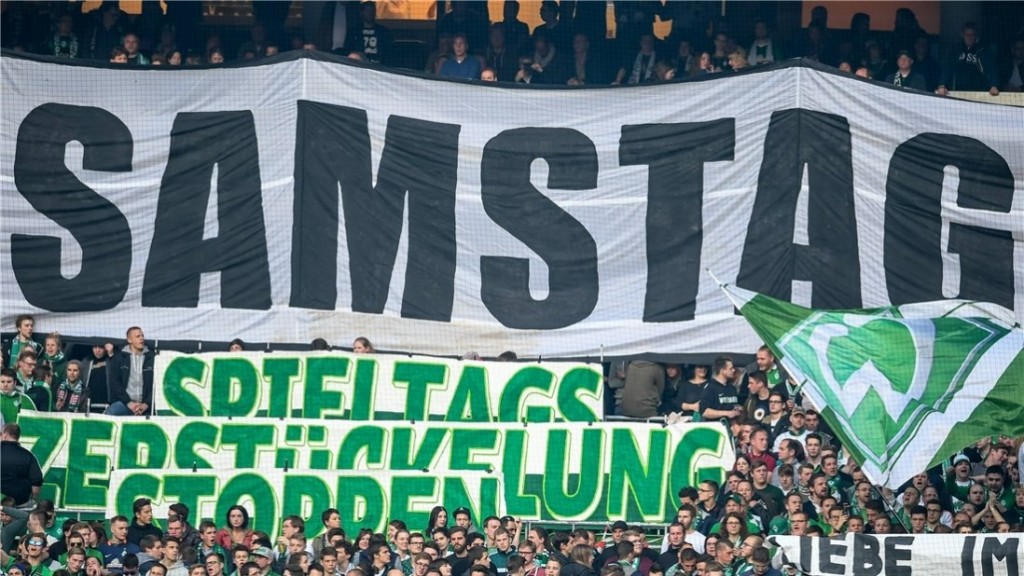
“Stoppen” – from left to right: Janine Ludwig (under the “O”), Ira (under the left “P”), Carol (betw. the “Ps”) Phoebe (under the right “P”), Helen (under the “E”)
P.S.: Eventually, in the very last game of the season, on May 14, 2016, Werder secured its continuance in the 1st league / Erste Bundesliga (“Klassenerhalt”) by winning 1:0 against Frankfurt. Hooray! “Nie mehr Zweite Liga!”
Poetic Alumnus
by Dr. Janine Ludwig
Last week, I attended a Dickinson Resident Directors’ Meeting in Málaga, Spain, where the directors of several European Dickinson programs and staff from the CGSE met to engage in fruitful discussions and exchange experiences.
To my surprise, this business trip brought about a completely unforeseen, coincidental reunion: Former Dickinson student Geo Nikolov ’14 gave a presentation at the cultural café “The Shakespeare,” where he was introduced by Prof. Eva Copeland, Director of the Dickinson in Málaga Program. I have known Geo since he had spent the academic year 2012/13 in our Bremen program, and I also knew that, after his graduation in 2014, he completed a master’s degree in Málaga. But little did I know that he also wrote poetry in Spanish (and English, too) and would be back in Málaga in order to present his first book: “Paseos marítimos” (Beach Promenades).
One has to know that Geo is a linguistic genius, speaking 4 languages (Bulgarian, English, German, and Spanish) at native-speaker level. And if that was not extraordinary enough, here is a geology major who writes poetry and will soon go on to work at a publishing company.
How nice to see a former student again in such circumstances!
Proud.
Walk
I come back from my walk
along the water
smelling as if
I have been sitting in front of a fire.
Nikolov, Geo: Paseos marítimos. Málaga: Mitad Doble ediciones. Ediciones del Genal, 2016. Coordina: Jonatan Santos. 95 pgs. ISBN: 978-84-16626-10-6. Precio: 9,95 €.
http://www.mitaddoble.com/paseos-maritimos/

